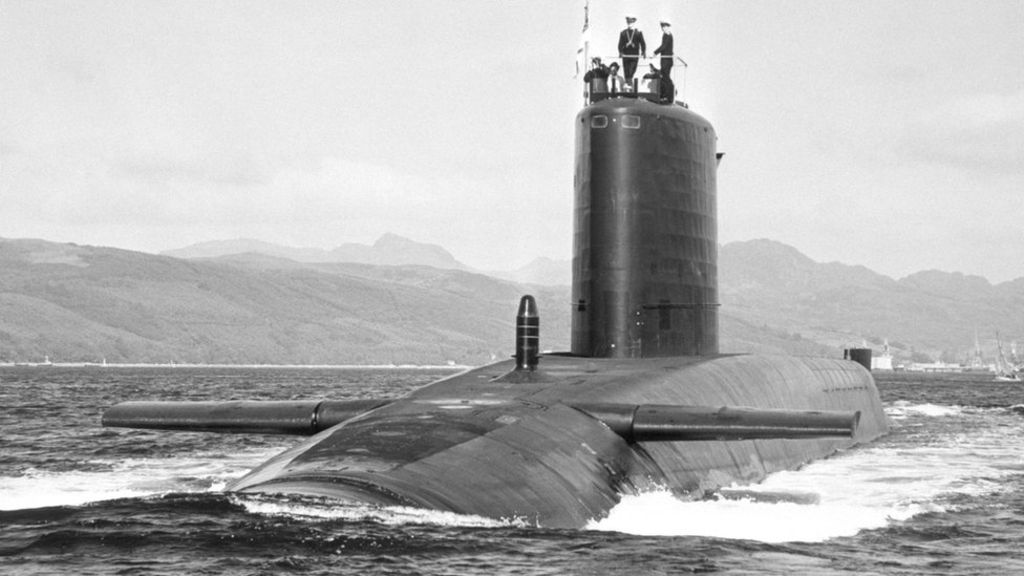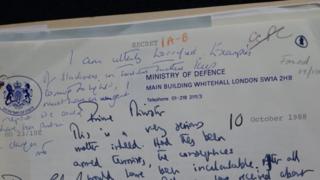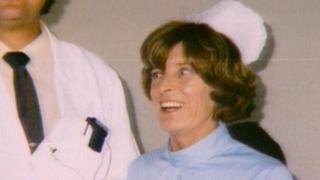Cabinet files reveal plan to shoot nuclear intruders – BBC News

Sentries at Faslane naval base were ordered to shoot suspected intruders after three people broke into a nuclear submarine, cabinet papers show.
PM Margaret Thatcher, who was told of the order, said she was “horrified” that the intrusion had succeeded.
The papers are among records filed in 1989 and 1990 and released on Friday.
They also include a letter from Mrs Thatcher to Saddam Hussein, asking for clemency for British nurse Daphne Parish, who was accused of spying.
Details of how a magistrate from Hampshire persuaded Mrs Thatcher to change the law on so-called “acid house” parties are also revealed in the annual Cabinet Office release, by the National Archives in Kew.
‘Grave danger’ at Faslane
Three anti-nuclear demonstrators successfully cut through the perimeter fence at Faslane, on the Clyde, in the early hours of 10 October 1988.
Mrs Thatcher was told of the incident later that day, in an MoD memo that said “there was absolutely no risk of a nuclear explosion or radiation”.
But Mrs Thatcher – writing by hand on the papers, which were marked “secret” – said: “I am utterly horrified. Examples of slackness in sensitive matters keep coming to light.”
The demonstrators went through an open submarine hatch to reach the control room of HMS Repulse, a ballistic missile submarine, where they sprayed anti-nuclear slogans before being arrested.
A fourth demonstrator attempted to swim into the base, but was caught.
Mrs Thatcher added: “I must have an urgent report. We could well have been put in grave danger.”
 Image copyright National Archives
Image copyright National Archives The memo of the incident listed several failings, including:
- The alarm system on the outer fence had been switched off
- Barbed wire coils inside the perimeter had been removed
- Construction workers left ladders lying about
- Builders’ cabins and equipment gave the intruders cover
- Two police patrols were on a tea-break and had not been relieved
- Dustbins had been lashed to the fence of the most secure area of the base, allowing the intruders to climb over.
- Floodlights were not working properly
- Only three Royal Marine sentries were on duty instead of four
As a result of the intrusion, Mrs Thatcher was told, sentries were ordered “as a last resort” to shoot anyone suspected of trying to sabotage a submarine or nuclear weapon.
During the break-in, one sentry apparently saw the intruders but did not open fire.
Three senior Ministry of Defence police officers and 10 Royal Navy personnel were disciplined after the inquiry, although more break-ins would later occur – one in 2002 and another in 2014.
Since the Eighties, anti-nuclear protesters have peacefully camped outside Faslane, which is now the home of Trident nuclear weapons.
Thatcher to Saddam: ‘Horror’ at treatment of UK citizens
 Image copyright Newsroom Southeast
Image copyright Newsroom Southeast Mrs Thatcher personally appealed to Saddam Hussein when a British nurse was jailed for spying in Iraq.
Daphne Parish, was arrested alongside her friend Observer journalist Farzad Bazoft in February 1990 after the pair were found close to an Iraqi weapons research site.
The Prime Minister intervened for Mrs Parish, writing to Hussein on 21 February. The former Iraqi leader replied a week later, “personally” assuring her that the “law in effect will be strictly observed throughout the legal proceedings”.
Mrs Parish was jailed for 15 years and released after six months, but Farzad Bazoft was executed.
Mrs Thatcher wrote once more, on 10 March, to say that she was “very taken aback, indeed horrified” by the punishments.
The Cabinet Office file containing the letters also showed that Crown Prince Fahd of Saudi Arabia was among those who appealed for clemency.
Cambridge students ‘rabid conservatives’, says Princess Margaret
 Image copyright PA
Image copyright PA Cambridge University’s debating society was “full of rabid conservatives”, Princess Margaret wrote to Mrs Thatcher in 1980.
The Queen’s sister said there was “not a Trotskyite to argue with” at a “rather dull” debate about religion at the Cambridge Union Society.
In a series of letters, which the cabinet waited a decade to file, Princess Margaret also dismissed Muhammad Ali as a “silly boxer”.
At the time, Ali had been visiting African countries to convince them to boycott the 1980 Moscow Olympics. The princess thought he would “make a hash of it”.
Villager inspires 20,000 fine for ‘acid house’ raves
 Image copyright PA
Image copyright PA A Thatcherite crackdown on acid house raves came from an unlikely source – a village magistrate.
In August 1989, a justice of the peace from Bentley in Hampshire, Gerald Coke, complained to his local MP that an all-night rave had kept the entire village awake.
Despite 3,000 people apparently attending the party, police had refused to intervene.
“I have never known such a feeling of collective anger and helplessness”, he wrote, warning there was a real risk of “bloodshed or serious damage to property” if people decided to take matters into their own hands.
 Image copyright PA
Image copyright PA Crucially, the letter reached Downing Street because Mr Coke also copied in his nephew, Archie Hamilton, the Prime Minister’s former parliamentary private secretary.
Mrs Thatcher told her officials to take action.
“If this is a new ‘fashion’ we must be prepared for it and preferably prevent such things from starting,” she wrote.
Two months later, the government outlined plans for a private member’s bill to introduce fines of up to 20,000 for illegal party organisers, and new powers to confiscate their profits.
Read more: http://www.bbc.co.uk/news/uk-38369742